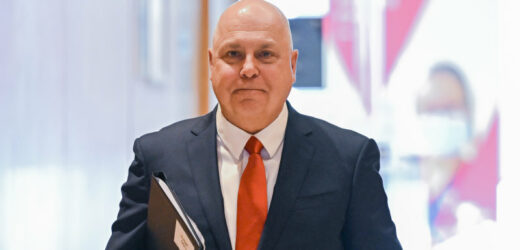Save articles for later
Add articles to your saved list and come back to them any time.
The state budget is 5½ weeks away but Treasurer Tim Pallas is desperate for a miracle.
Despite Jim Chalmers warning that slow economic growth and global financial volatility have somewhat spoiled his own budget strategy, some Victorian cabinet ministers still hold out hope that the federal treasurer will wave his magic wand, fill the state’s coffers and save them from making some tough decisions.
Victorian Treasurer Tim Pallas is expected to put the brakes on spending in next month’s state budget.Credit: Nine
But the inside word from a member of the Albanese government’s economic review committee is that any special deal for Victoria is highly unlikely.
As one Victorian cabinet minister complained this week: “We were all hoping for a bit more help, but it’s actually a bit more difficult when you have the same colour team in Canberra.”
The message from the Albanese government is clear: We inherited a bad budget and propping up the states isn’t a priority.
According to the independent Parliamentary Budget Office, Victoria’s net debt is forecast to surge from $115 billion this year to $165 billion by 2025-26.
This explains why Pallas and Daniel Andrews have started to warn Victorians to prepare for a “challenging budget”.
When this column asked a cabinet minister whether this change in rhetoric was a case of expectations management by the government so that we are all surprised by the upside come May 23; the answer was a firm: “No.”
So with no special treatment from Canberra, where is the knife likely to fall?
As a starting point, government insiders say the brakes will be put on Victoria’s $21 billion-a-year construction pipeline to make sure there are enough materials and workers to keep the economy ticking over.
Don’t be surprised if the timeline for the North East Link or West Gate Tunnel projects are pushed back even further, mirroring moves by the NSW government last year when it delayed several multibillion-dollar transport projects as national labour demands surged.
Then there are those infrastructure projects that have barely even started, like Melbourne Airport Rail and the Geelong Fast Rail, that are likely to shift into an even slower gear (if that’s possible).
Government insiders say the latter – a fast rail project between Melbourne and Geelong – could potentially become one of the more high-profile victims of budget repair.
The state government has long been cynical about the project, which was announced by then-prime minister Scott Morrison on the eve of the 2019 election. Once finished, in 2029, it was meant to slash the journey time to Geelong to just 32 minutes. That figure was later revised to 50 minutes – not much faster than the current travel time of just over an hour. Now the 2023 start date looks shaky.
But slamming the brakes on infrastructure projects is unlikely to be enough to help the state’s crippled budget.
Under Andrews’ watch, the number of public servants in Victoria have risen by more than 25 per cent, and with it the state payroll bill. So, it’s little wonder government departments have been ordered to cut their budgets by 10 per cent.
While there is no palatable options when it comes to reining in spending, the outlook isn’t any easier when it comes to raising revenue through taxes.
Cabinet ministers acknowledge the rising cost of living is hurting families, but there is a reluctant acceptance that now is the time to make some unpopular decisions – 3½ years from the next election.
According to cabinet ministers, the government is investigating options to boost revenue without adding too much extra pressure to household budgets, leading to speculation from the business community that it will be compelled to chip in.
The political calculation is that Labor’s payroll tax levy – announced in 2021 – aimed at businesses with more than $10 million in wages, had zero electoral impact and anger about any extra taxes will have faded by the next election.
If next month’s budget is as dire as predicted, then the government should be applauded for showing restraint, albeit eight years late. But any praise should be limited, given the decay of the state’s finances was well underway before the pandemic.
On Thursday, Andrews blamed a toxic mix of COVID-19 impacts, “congestion in the construction market” and migration patterns as all contributing to the state’s financial woes.
While pumping billions of dollars into the economy in business support, rent relief and sick payments during COVID-19 kept the state afloat, the Victorian budget was already looking shaky when the Andrews government doubled the state’s borrowings in 2019 to fund its election promises.
Pallas is no doubt nervous about delivering a slash and burn budget next month but, for once, the long-term benefits of fiscal restraint must take precedence over any short-term unpopularity.
Annika Smethurst is state political editor.
The Opinion newsletter is a weekly wrap of views that will challenge, champion and inform your own. Sign up here.
Most Viewed in Politics
From our partners
Source: Read Full Article



